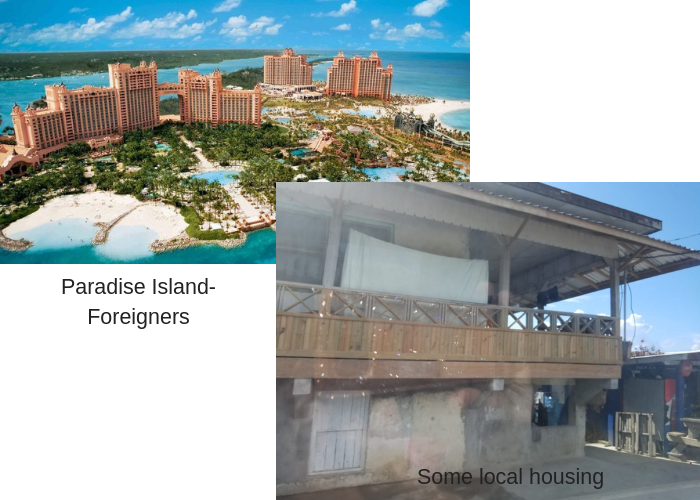The Bahamas is a case study in the myth that Foreign Direct Investment (FDI) will bring prosperity to local economies. Instead the myth of foreign direct investment is an unsubstantiated theory that is peddled in predominantly African societies. You have been heard it told that the key to development in African nations or nations with majority African nations in the Caribbean that direct foreign investment will lead to wealth creation. Let’s take a look at the Bahamas an island in the Caribbean as a case study.
The Bahamas were 1st invaded by Christopher the pedophile Columbus in 1492. When Columbus did not find any gold he abandoned the island then the British took over. The Bahamas became a British crown colony in 1718. However, the British also did not develop the Bahamas. Instead the island was used by British loyalists who brought their slaves. Slavery on the island was later abolished in 1834. The Bahamas became an independent Commonwealth realm in 1973, and stupidly retained the British monarch, then and currently Queen Elizabeth II, as its head of state. In essence they are still not totally free from colonial British rule.
Real economic development in the Bahamas did not begin until 1973 when they became partially independent. The people of the Bahamas built their first university only after independence. The Prime Minister’s economic focus was tourism. Tourism as an industry not only accounts for over 60% of the Bahamian GDP, but provides jobs for more than half the country’s workforce. This is unfortunate because tourism is mostly service based and creates low wages for the workers. Tourism is also vulnerable to the benevolence of the richer nations. This is in contrast with other countries that also flourished during the same time such as South Korea or Japan. They focused on innovation and engaged in manufacturing to alleviate poverty rather than tourism.
This insatiable focus on tourism in the Bahamas led to the sale of one of the most beautiful areas in the Bahamas known today as Paradise Island. If you look up GDP numbers for the Bahamas you will see that the Bahamas GDP per capita is very high $30, 762 in 2017 and $12.16BN in national GDP. These numbers are marvelous except there is a catch and looking purely at GDP as an economic indicator is very misleading when it comes to the Bahamas. The GDP is misleading because all the economic activity that is generated on the island is a result of direct foreign investment and the owners take their profits offshore. The foreign investors do not provide a large enough tax base and so the tax burden is shifted to average Bahamians making low wages and paying over 12% in sales tax. How did the Bahamas get to this stage?
Paradise Island was sold by the Bahamian government for a measly $79 million in the 1980s in an effort to bring developments. One thing all black nations should learn is that land should never be sold. If need arises, lease rather than sell the land.
The land was purchased by a Mr. Axell a Swedish entrepreneur who then sold it American President Donald Trump and to Griffin for $400 million. Today, foreigners live on and enjoy Paradise Island while the locals are only allowed to visit it when they are working in servitude to foreigners. The only access that locals of the Bahamas have to the economy is working as low wage tour guides, drivers and maids donning colonial costumes for the pleasure of the rich and famous.
The public infrastructure is crumbling, many buildings destroyed by weather related causes several years ago remain in ruins. While the Bahamas is a touted as a paradise and the role model for Caribbean nations, the reality is further from the truth. Many of the government owned buildings such as Post Office and several Ministry buildings in Nassau the capital city are crumbling dilapidated. The Bahamians who find tourism jobs often work for low wages and rely on tips. The locals access to any sort of business ownership is often limited to becoming a fisherman, running a shack restuarant or making and selling crafts that can be sold to tourists.
The Bahamas is an example of the total failure of the myth of foreign direct investment which is often only sold to black people, especially those who were former colonies of the British, French, Belgians or Spanish. In contrast, China for example does not permit foreigners to own 100% of any Chinese industry, company or sector. As a result China has successfully lifted hundreds of millions of people out of poverty in the past four decades. In the past, the government of Robert Mugabe in Zimbabwe also adopted this 51% rule which ensures that the locals can also participate in the ownership of the resources of the nation.





4 responses to “Bahamas Case Study in Myth of Foreign Direct Investment”
This is truly eye opening i had no idea the conditions were that bad. You have opened my eyes.
wow interesting and informative however low on solutions
This is the sad reality that we black people fo not face, tourism was good 3 decades ago but this is 2018 the future belongs to technologists & how do we develop technology to give the world what it needs so we can export something & generate wealth
Our people need to focus on building small business which has proven to create millionaires rather than direct foreign investment which only brings low wages.